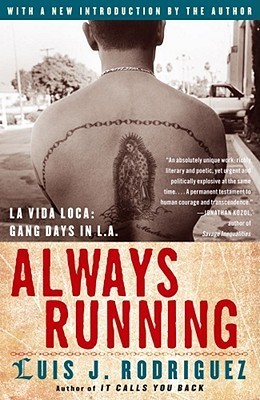TL;DR
Always Running is a gripping memoir by Luis J. Rodríguez about his life in a Chicano gang in East Los Angeles and his struggle to break free through education and the power of words.
What is Always Running about
Always Running by Luis J. Rodríguez is an award-winning memoir detailing the author's tumultuous life as a gang member in East Los Angeles. By the age of twelve, Rodríguez was already involved in gang warfare, witnessing violence and criminal activities. The book narrates his journey from the violent streets to finding a way out through education and writing. As he battles to leave the gang life behind, he also faces the challenge of preventing his own son from falling into the same destructive path. The memoir offers a raw and honest portrayal of gang life while ultimately conveying a message of hope and redemption.
Always Running 6 Key Takeaways
The Lure of Gang Culture
Rodríguez vividly describes the magnetic pull of gang life for young Chicanos in East Los Angeles, where violence and crime become normalized aspects of daily existence.
Impact of Violence
The memoir illustrates the devastating effects of gang violence, not only on those directly involved but also on their families and communities.
Power of Education
Rodríguez finds a way out of the gang life through education, demonstrating how learning can be a powerful tool for personal transformation and liberation.
Role of Mentorship
The book emphasizes the importance of mentorship and guidance in helping young individuals navigate challenging environments and make positive changes.
Cycle of Violence
Rodríguez's story highlights the cyclical nature of violence and how breaking free from it requires significant effort and support from the community.
Redemption and Hope
Despite the brutal reality of gang life, the memoir ultimately conveys a message of hope, showing that redemption is possible even in the most dire circumstances.
Top Always Running Quotes
- The barrio doesn’t make you; you make the barrio.
- You're in a war zone. Survival is all you can hope for.
- I found my voice, and with it, I found a way out.
Who should read Always Running?
Always Running is essential reading for anyone interested in understanding the realities of gang life, particularly educators, social workers, policymakers, and those working with at-risk youth. It also offers valuable insights for readers seeking stories of resilience and redemption.
Always Running Best Reviews
- The New York Times praises Always Running as 'a brutally honest and riveting account of gang life, offering a unique and personal perspective on a pervasive societal issue.'
- Publisher's Weekly calls the memoir 'a powerful, and poignant story of resilience and the transformative power of education and art.'
- The Los Angeles Times describes the book as 'an essential read for understanding the complexities of gang life and the pathways to overcoming it.'
People also liked these summaries
Always Running FAQs
Is Always Running based on a true story?
Yes, Always Running is a true story. It is a memoir by Luis J. Rodríguez detailing his life in a Chicano gang and his struggle to break free from it.
What is the main idea of Always Running?
The main idea of Always Running is a coming-of-age story about how Luis J. Rodríguez grew from a young gang member into a confident adult, ultimately finding redemption through education and mentorship.
What happens at the end of Always Running?
The memoir ends with Rodríguez escaping long-term imprisonment and being confronted by an old rival, Chava, who is disabled from an attempt on his life, symbolizing the ongoing challenges and consequences of gang life.
